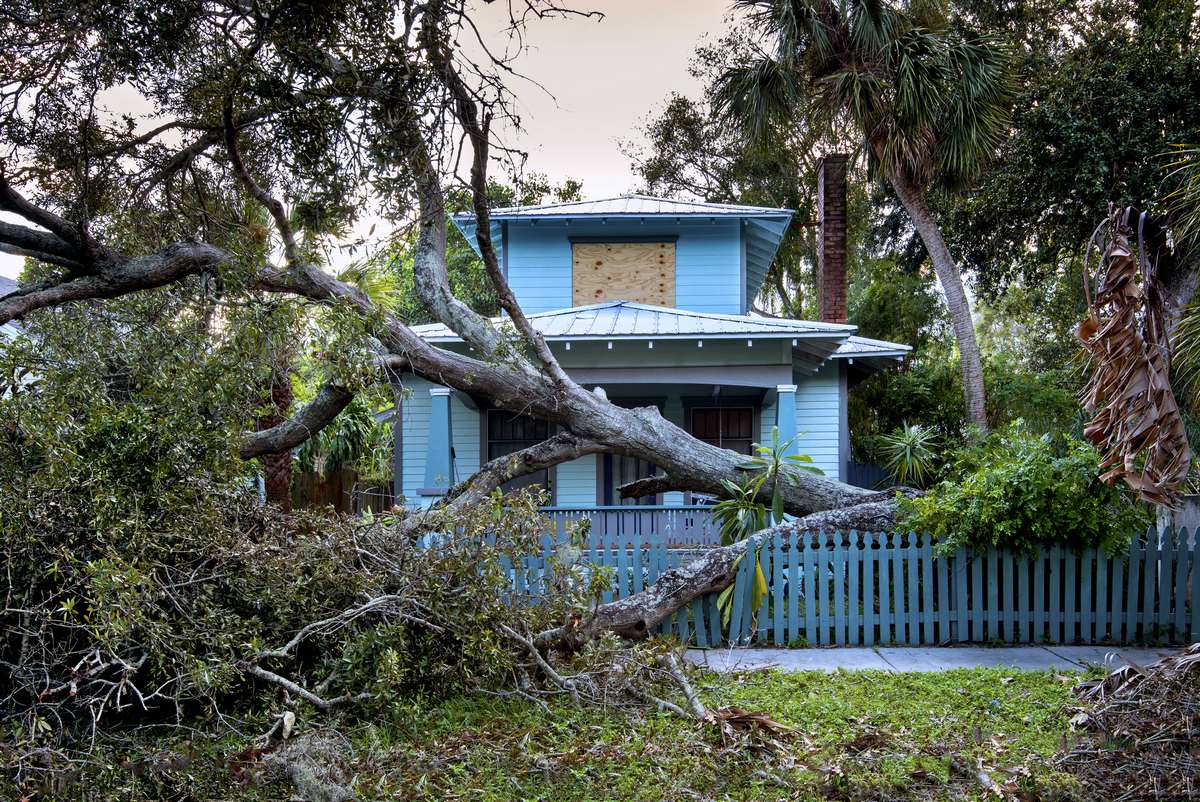Summary
Living in a hurricane-prone region requires knowledge of hurricane insurance. It’s essential to understand how hurricane insurance works and what it covers.
- Hurricane insurance may be required by insurers in some states. It’s coverage that protects against losses from flooding and windstorms during a hurricane.
- Hurricane deductibles are frequently separated from your standard homeowners insurance deductible. They are usually based on a percentage of a home’s insured value, rather than as a set dollar amount .
When a hurricane threatens your home, the last thing you want to worry about is whether you’re financially protected. Lashing rain and whipping winds can be incredibly damaging and costly to repair. Hurricane season runs from June 1 to November 30 every year in North America. This six-month period is when homeowners are most likely to see a named storm make landfall.
Some homeowners insurance policies cover hurricanes, but certain areas are at higher risk. Some lenders in hurricane-prone regions are requiring homeowners to carry additional coverage to protect against losses from hurricanes.
Technically speaking, hurricane insurance isn’t a specific type of policy (like earthquake insurance, for example). Hurricanes can cause two types of damage: flooding and windstorm damage. You can purchase separate coverage to protect against both.
Start saving
on insurance

What Does Hurricane Insurance Cover?
Most standard homeowners insurance policies will cover wind damage and destruction caused by wind-driven rain. Homeowners insurance policies cover damage caused by storms. This includes shingles being blown off the roof and rain entering the home.
Hurricanes can impact large areas, and there are usually restrictions on insurance claims. It’s extremely important to know exactly what your homeowners policy covers.
Flooding isn’t always covered by standard homeowners insurance policies. Flooding is generally defined as water that enters the home after touching the ground first. This includes coastal storm surges and heavy rainfall that causes bodies of water to overflow or a levee to fail.
Because hurricanes often cause flooding, anyone who lives in an at-risk region should consider purchasing flood insurance. This is true even if the home is not in a federally designated flood zone. When Hurricane Harvey hit Houston in 2017, nearly 80% of the homes that suffered flood damage did not carry flood insurance. Because standard homeowners insurance doesn’t cover flood damage, these homes were unprotected.
If you live in a region where hurricanes are common, your homeowners insurance policy might have limits on windstorm damage. It’s also possible that it might not cover it at all. You will need to purchase a separate rider or additional policy to protect your home against windstorm damage. In some states, this coverage may be available through a state-run insurance pool.
How Do Hurricane Insurance Deductibles Work?
Insurance companies now offer homeowners insurance policies with separate deductibles for hurricane claims. This is due to some states being more prone to hurricane damage.
In 19 states that are prone to hurricanes, standard homeowners insurance policies carry a separate hurricane deductible. This is in addition to the standard deductible.
These states include:
- East: Connecticut, Delaware, Maine, Maryland, Massachusetts, New Jersey, New York, North Carolina, Pennsylvania, Rhode Island, South Carolina, Virginia and Washington, D.C.
- South: Alabama, Georgia, Louisiana, Mississippi, and Texas
- West: Hawaii
Each of these states has different deductibles and windstorm policies, and state insurance regulations can change. Live in one of these states? Talk to your insurance agent or state insurance commission office to learn which hurricane deductibles apply.
A standard deductible is typically a set dollar amount, such as $500. This means that if there’s an electrical fire, for example, the homeowner is responsible for the first $500 of repairs. The insurer then pays the rest of the claim.
A hurricane insurance deductible is typically based on a percentage of the home’s insured value. If a home is insured for $250,000 and has a hurricane deductible of 5%, the homeowner is responsible for the first $12,500 of a claim resulting from hurricane damage. A 2% hurricane deductible on the same property would mean a homeowner is responsible for the first $5,000 of the claim.
If you live in a coastal state, it is important to check your homeowners insurance policy. Look on the declarations page to see if you have a separate hurricane deductible. Almost every coastal state from Maine to Florida has a hurricane deductible in their homeowners insurance policy. This includes states like Maine, Florida, and all the states in between.
Hurricane Insurance Definitions
The jargon you’ll come across when exploring hurricane coverage can be confusing. Here are some important terms you should know:
Deductible: This is the amount you are responsible for paying when you submit an insurance claim.
Mandatory deductible: This rate is set by an insurance regulator. It could be a state level authority, or an insurance rule or law.
Percentage deductible: These deductibles are determined using the insured value of a property. Hurricane deductible percentages can range from 1% to 5% of a home’s insured value.
Named storm deductible: If your home is damaged due to a storm, it is eligible for compensation. This applies if the storm was named by the National Hurricane Center or the National Weather Service. If your policy contains this phrase, make sure you understand what the specific “trigger event” is.
Trigger events: Timing is important for some damages. For example, damages that happen before a storm is named and after it makes landfall for a set time period. These trigger events will determine how a hurricane deductible applies.
Storm classifications according to the National Hurricane Center can be included in trigger-event definitions that will affect the type of deductible you will pay if your home suffers storm damage. You should pay close attention to your insurance policy to see what is covered.
- Tropical depression. The first stage of a storm that has potential to develop into a hurricane with winds up to 38 mph.
- Tropical storm. If the winds from a tropical depression increase to 39 mph, it is recategorized as a tropical storm.
- Hurricane. If a tropical storm continues to grow, it may be recategorized as a hurricane. This is when its winds increase in speed to more than 74 mph.
- Hurricane intensity. A storm’s strength is measured from one to five on the Saffir-Simpson wind speed scale. Category one is from 74 to 95 mph sustained wind speed. Category five is wind speeds of 157 mph or higher.
- Hurricane watch: This is issued when a storm system poses a threat to coastal areas.
- Hurricane warning: This is issued when a storm is predicted to reach landfall in a coastal area within 24 hours.
Does Insurance Pay for Hurricane Damage?
Hurricane damage can be extensive, and who pays can depend heavily on what types of insurance coverage a homeowner carries. Heavy rain can cause flooding that damages your home. If you don’t have flood insurance, the financial burden of this damage could be yours alone. The Federal Emergency Management Agency (FEMA) may offer disaster relief, but this can be limited.
If the hurricane damage is the result of wind, you’ll be responsible for the deductible, and your homeowners insurance will cover the rest. However, it also depends on the details in your specific homeowners insurance policy. The amount you owe will depends on several factors.
You will need to know whether or not you are subject to a hurricane deductible. You’ll also want to know your home’s insured value. It’s also important to know if the storm is defined as a trigger event in your policy.
See how to save
on insurance

How Can I Get a Quote for Hurricane Insurance?
Are you ready to get a quote for hurricane insurance? Either apply online or contact the team at Rate Insurance to get the assistance you need.
Disclaimer:
All information provided in this publication is for informational and educational purposes only, and in no way is any of the content contained herein to be construed as financial, investment, or legal advice or instruction.
Rate Insurance does not guarantee the quality, accuracy, completeness or timelines of the information in this publication. While efforts are made to verify the information provided, the information should not be assumed to be error free. Some information in the publication may have been provided by third parties and has not necessarily been verified by Rate Insurance. Rate Insurance, its affiliates and subsidiaries do not assume any liability for the information contained herein, be it direct, indirect, consequential, special, or exemplary, or other damages whatsoever and howsoever caused, arising out of or in connection with the use of this publication or in reliance on the information, including any personal or pecuniary loss, whether the action is in contract, tort (including negligence) or other tortious action.

